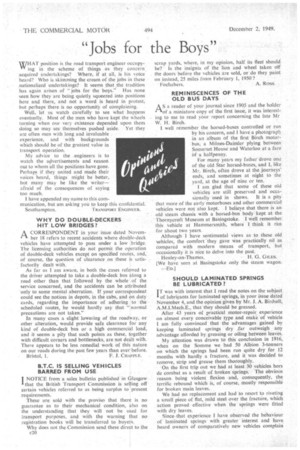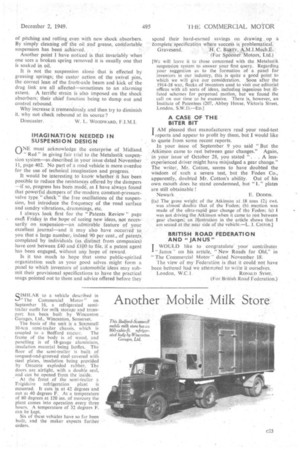jobs for . the Boys"
Page 66

Page 69

If you've noticed an error in this article please click here to report it so we can fix it.
WHAT position is the road transport engineer occupy
ing in the scheme of things as they concern acquired undertakings? Where, if at all, is his voice heard? Who is skimming the cream of the jobs in these nationalized undertakings? It seems that the tradition has again arisen of "jobs for the boys." Has none seen how they are being quietly. squeezed into positions here and there, and not a word is heard in protest, but perhaps there is no opportunity of complaining.
Well, let us watch carefully to see what happens eventually. Most of the men who have kept the wheels turning when our very existence depended upon them doing so may see themselves pushed aside. Yet they are often men with long and invaluable experience, and with backgrounds which should be of the greatest value in transport operation.
My advice to the _engineers is to watch the advertisements and reason out to whom all the positions have gone. Perhaps if they united and made their voices heard, things might be better, but many may he like the writer— afraid of the consequences of saying too much.
I have appended my name to this com munication, but am asking you to keep this confidential.
Southampton. TRANSPORT ENGINEER.
WHY DO DOUBLE-DECKERS HIT LOW BRIDGES?
A CORRESPONDENT in your issue dated Novem
ber 18 refers to recent accidents where double-deck vehicles have attempted to pass under a low bridge. The licensing authorities do not permit the operation of double-deck vehicles except on specified routes, and, of course, the question of clearance on these is satisfactorily dealt with.
As far as I am aware, in both the cases referred to the driver attempted to take a double-deck bus along a road other than that followed by the whole of the service concerned, and the accidents can be attributed only to some mental aberration. If your correspondent could see the notices in depots, in the cabs, and on duty cards, regarding the importance of adhering to the scheduled routes, he would hardly say that normal precautions are not taken."
In many cases a slight lowering of the roadway, or other alteration, would provide safe clearance for any kind of double-deck bus or a high commercial load, and it seems a pity that such points as these, together with difficult corners and bottlenecks, are not dealt with. There appears to be less remedial work of this nature on our roads during the past few years than ever before.
Bristol, 1. F. J. CHAPPLE.
B.T.C. IS SELLING VEHICLES BARRED FROM USE I NOTICE from a sales bulletin published in Glasgow that the British Transport Commission is selling off certain vehicles referred to as being surplus to present requirements.
These are sold with the proviso that there is no guarantee as to their mechanical condition, also on the understanding that they will not be used for transport purposes, and with the warning that no registration books will be transferred to buyers.
Why does not the Commission send these direct to the c20 scrap yards, where, in my opinion, half its fleet should he? Is the insignia of the lion and wheel taken off the doors before the vehicles are sold, or do they paint on instead, 25 miles from February 1, 1950?
• Fochabers. A. Ross.
REMINISCENCES OF THE OLD BUS DAYS AS a reader of your journal since 1905 and the holder of a miniature copy of the first issue, it was interesting to me to read your report concerning the late Mr W. H. Birch.
I well remember the horsed-buses controlled or run by his concern, and I have a photograph in an album of the first Birch motorbus, a Milnes-Daimler plying between Somerset House and Waterloo Rt a fare
of a halfpenny. • For many years my father drove one of the old Star horsed-buses, and I, like Mr. Birch, often drove at the journeys" ends, and sometimes at night to the yard. at the age of nine or ten.
I am glad that some of these old vehicles are still preserved and occa sionally used in shows. It is a pity that more of the early motorbuses and other commercial vehicles were not also kept. I belieye that there is an old steam chassis with a horsed-bus body kept at the Thornycroft Museum at Basingstoke. I well remember this vehicle at Hammersmith, where I think it ran for about two years
Although I have sentimental views as to these old vehicles, the comfort they gave was practically nil as compared with modern means of transport, but occasionally it is nice to delve into the past.
Henley-on-Thames. H. G. GILES. [We have seen at Basingstoke only the steam wagon. —En.] SHOULD LAMINATED SPRINGS BE LUBRICATED?
IT was with interest that I read the notes on the subject I of lubricants for laminated springs, in your issue dated November 4, and the opinion given by Mr. J. A. Birdsell, A.M.1.Mech.E., that they should be greased.
After 43 years of practical motor-repair experience on almost every conceivable type and make of vehicle I am fully convinced that the advantages gained by keeping laminated springs dry Jar outweigh any advantage afforded by greasing or oiling between leaves.
My attention was drawn to this conclusion in 1916, when on the Somme we had 50 Albion 3-tonners on which the springs had been run quite dry for 12 months with hardly a fracture, and it was decided to remove, strip and grease them thoroughly.
• On the first trip out we had at least 30 vehicles hors de combat as a result of broken springs. 'The obvious reason being violent flexion and, consequently, the terrific rebound which is, of course, mostly responsible for broken main leaves.
We had no replacement and had to resort to riveting a small piece of flat, mild steel over the fracture, which action proved effective when the springs were fitted with dry leaves.
Since-that experience I have observed the behaviour of laminated springs with greater interest and have heard owners of comparatively new vehicles complain of pitching and rolling even with new shock absorbers. By simply cleaning off the oil and grease, cornfortable suspension has been achieved..
Another point I have noticed is that invariably when one sees a broken spring removed it is usually one that is soaked in oil.
It is not the suspension alone that is effected by greasing springs; the castor action of the swivel pins, the correct lean of the frodt-axle beam and kick of the drag link are all affected—sometimes to an alarming extent. A terrific strain is also imposed on the shock absorbers; their chief function being to damp out and control rebound.
Why increase it tremendously and then try to diminish it, why not check rebound at its source ?
Doncaster. W. L. WOODWARD, F.I.M.I.
IMAGINATION NEEDED IN SUSPENSION DESIGN
nNE must acknowledge the enterprise of Midland.
" Red" in giving fair trial to the Metalastik suspension system—as.described in your issue dated November 11, page 402. No part of a road vehicle is more overdue for the use of technical imagination and progress.
It would be interesting to know Whether it has been possible to reduce the resistances offered by the dampers —if so, progress has been made, as I have always found that powerful dampers of the' modern constant-pressurevalve type "check " the free oscillations of the suspension, but introduce the frequency of the road surface and sundry vibrations, drummings, etc.
I always look first for the "Patents Review page eact Friday in the hope of seeing new ideas, not necessarily on suSpension—an admirable feature of your excellent journal—and it may also have occurred. to you that a large number, indeed 90 per cent., of patents. completed by individuals (as distinct from companies) have cost between £40 and f.100 to file, if a patent agent has been engaged, without any hope of reward.
Is it too much to hope that some public-spirited organization such as your good selves might form a panel to which inventors of automobile ideas may submit their provisional specifications to have the practical snags pointed out to them and advice offered before they spend their hard-earned savings on drawing up a complete specification where success is problematical.
Gravesend. B. C. BARTY.
(For Spooner Motors, Ltd.) IWe will leave it to those concerned with the Metalastik suspension system to answer your first query. Regarding your suggestion as to the formation of a panel for inventors in our industry, this is quite a good point to which we will give our consideration. Soon after the 1914-18 war, flocks of inventors used to visit our editorial offices with all sorts of ideas, including ingenious but illfated schemes for perpetual motion, but we found the call on our time to be excessive, There is, however, an Institute of Patentees (207, Abbey House, Victoria Street, London, SW. l).—ED.]
A CASE OF THE BITER BIT
I AM pleased that manufacturers read your road-test reports and appear to profit by them, but I would like to quote from some recent reports.
In your issue of September 9 you said "But the Atkinson came to rest between gear changes." Again, in your issue' of October 28, you stated " . . . A lessexperienced driver might have misjudged a gear change." The writer, Mr. Cotton, seems to have doubted the wisdom of such a severe test, but the Foden Co., apparently, doubted Mr. Cotton's ability. Out of his own mouth does he stand condemned, but "L" plates are still obtainable!
Newark E. DODDS.
Ra) The gross weight of the Atkinson at 18 tons 12 cwt. was almost' doubie that of the Foden; (b) mention was made of the ultra-rapid gear change of the Foden; (c) I was not driving the Atkinson when it came to rest between gear changes; an illustration in the article shows that I am seated at the near side of the vehicle.—L. J. Cotton.)
BRITISH ROAD FEDERATION AND " JAN US "
WOULD like to congratulate' your contributoi 1 "Janus " on his article, "New Roads for Old," in "The Commercial Motor" dated NOvember
The view of my Federation is that it could not have been bettered had we attempted to write it ourselves.
London, W.C.1. RONALD SYM11.
(For British Road Federation.)












































































































